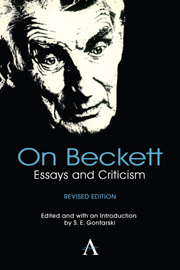Book contents
- Frontmatter
- Contents
- The Essential Beckett: A Preface to the Second Edition
- A Beckett Chronology
- Acknowledgments
- Crritics and Crriticism: “Getting Known”
- Preliminaries
- Beckett and Merlin
- Samuel Beckett and the Visual Arts: The Embarrassment of Allegory
- When is the End Not the End? The Idea of Fiction in Beckett
- The Page
- The Stage
- Coda
- Notes on Contributors
When is the End Not the End? The Idea of Fiction in Beckett
from Preliminaries
Published online by Cambridge University Press: 05 May 2013
- Frontmatter
- Contents
- The Essential Beckett: A Preface to the Second Edition
- A Beckett Chronology
- Acknowledgments
- Crritics and Crriticism: “Getting Known”
- Preliminaries
- Beckett and Merlin
- Samuel Beckett and the Visual Arts: The Embarrassment of Allegory
- When is the End Not the End? The Idea of Fiction in Beckett
- The Page
- The Stage
- Coda
- Notes on Contributors
Summary
“Although I am not of the opinion that in this dark age it is only negativism that is fit for literature, nevertheless the affirmative view, even though it may from time to time criticize the ‘byproducts' of the age, does smack of hypocrisy.” This striking statement by Ernst Fischer is to be found in an article on Beckett that presents Fischer's ideas on modern Marxist esthetics. In fact, Beckett's work offers nothing affirmative, and for this reason it has often been regarded as simply the image of an existence characterized—in the words of Georg Lukács—by the “most fundamental pathological debasement of man.” Such judgments are by no means confined specifically to Marxist literary criticism; they also arise when attempts are made to expound Beckett against the background of metaphysics or literary history, and they are often made with the same emphasis. Though one may suppose that even Beckett's critics do not always expect from literature an affirmative statement on the modern condition, nevertheless their judgments would seem to depend on a traditional criterion of literature, namely, that it should give a representative view of life.
- Type
- Chapter
- Information
- On BeckettEssays and Criticism, pp. 36 - 50Publisher: Anthem PressPrint publication year: 2012



